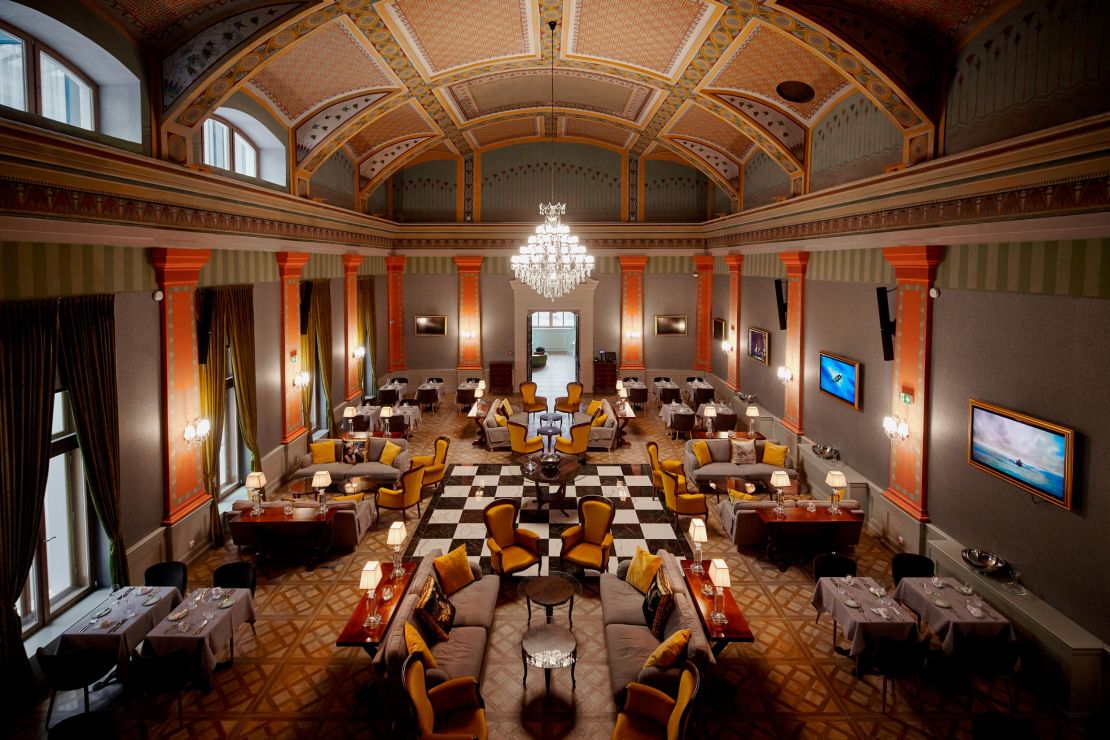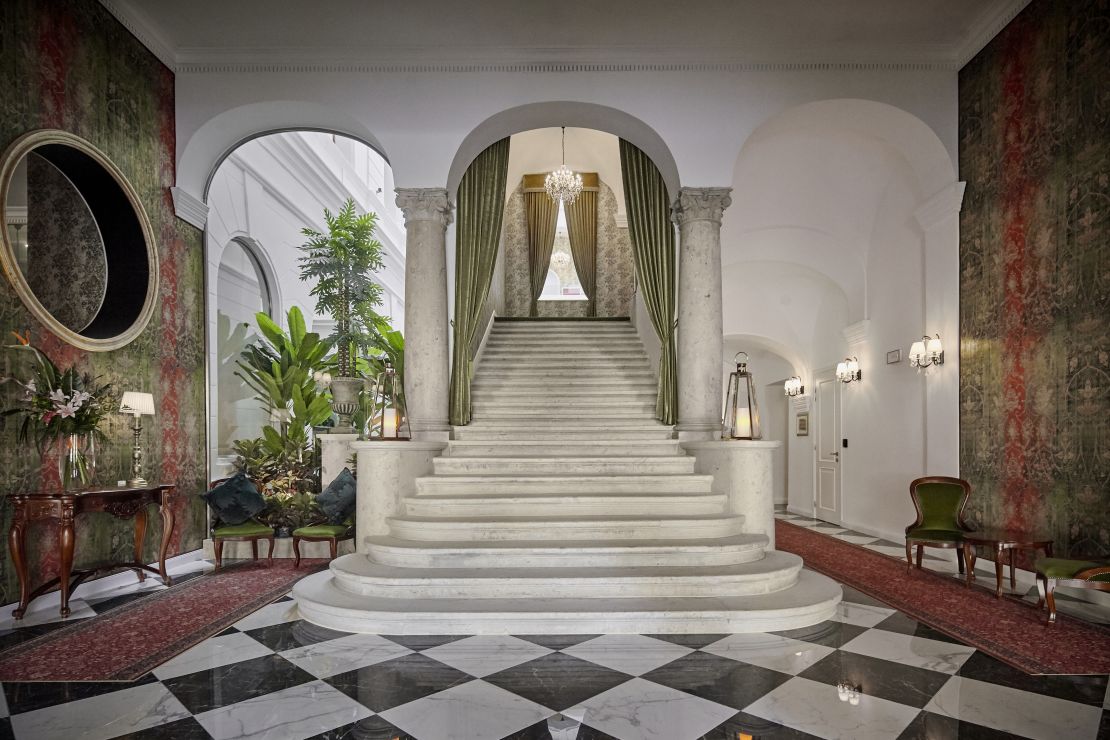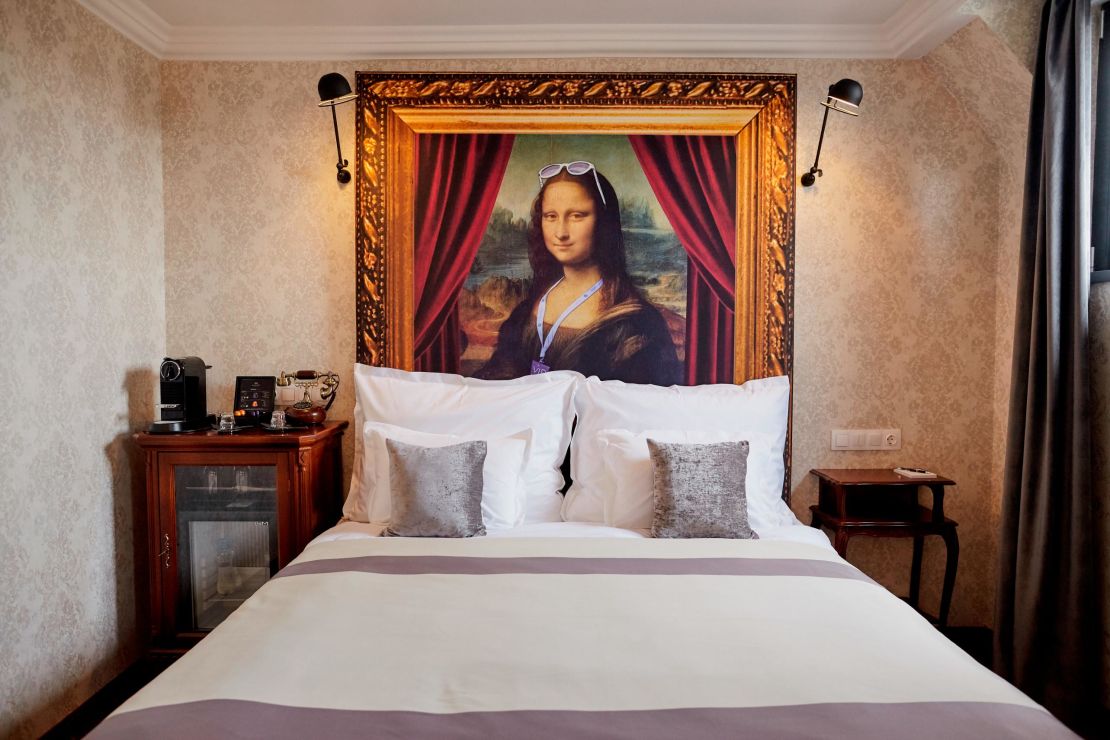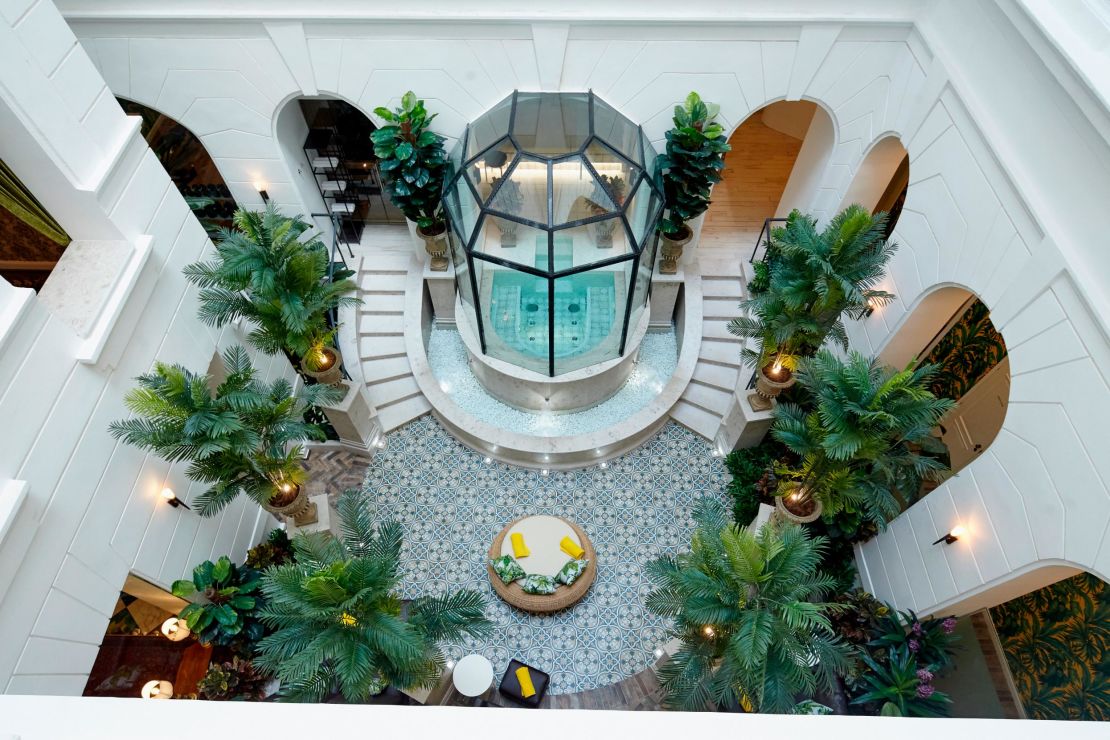One of the first things you’ll notice on entering the Mystery Hotel Budapest is the Aladdin-style magic carpet “floating” above the reception desk.
This is the first indication there’s much more to this boutique hotel than meets the eye.
Then there’s the countless light boxes on the walls displaying animated pictures that change several times a day and the elevator, which is partially hidden by velvet curtains.
Depending on which room you’re staying in, you could find yourself lying against a headboard with a version of Johannes Vermeer’s “Girl with a Pearl Earring,” where the “girl” has an iPhone in her hand, or a “party girl” interpretation of Da Vinci’s “Mona Lisa” complete with VIP passes to Budapest’s Sziget Festival.
And if you happen to book visit the “secret” Pythagoras meeting room, you’ll have to figure out how to open it yourself (hint – there’s an unassuming box involved).
Located in Budapest’s Terézváros district, the Mystery Hotel is arguably one of the most thrilling hotels in the city thanks to the intrigue that lies inside its walls.
It’s set inside what was once the main headquarters of the Symbolic Grand Lodge of Hungarian Freemasons, providing the inspiration for its enigmatic theme, along with movies such as “The Da Vinci Code.”
Instagram friendly

While it lacks the dramatic city views and central location of some of Budapest more famous hotels, the property, which opened in May 2019, is fast becoming one of the most Instagram-friendly places to stay in Budapest.
This is certainly no accident. In fact, the hotel’s designer Zoltán Varró admits he had “likes” in mind when conceptualizing the property.
“Instagram has really changed the hotel industry,” Varró tells CNN Travel. “Around 20 years ago, people wanted to go to big names because they felt safe with them.
“Now the most important thing is to stand out. Everyone is looking for something special. Social media is vital.
“When a guest sees something amazing and takes a picture, it can be shared with the rest of the world in seconds.”
Viktória Berényi, director of business development at the Mystery Hotel, says social media has helped to bring in a large number of bookings.
“First impressions are everything,” says Berényi. “There’s a lot of competition in Budapest. We had some difficulties with the engagement of people at first.
“But we’ve had lots of guests who come here because they saw the pictures on Instagram.”
One of the many intriguing areas of the hotel is the Great Hall, which serves as a dining area, a bar, as well as a lobby.
Varró decided to make it the building’s main focus after seeing photographs displaying the significance of the room during the 1890s, when Hungarian Freemasons regularly congregated here.
Freemasonry past

One of the most influential and well-known secret societies, Freemasonry was founded in the UK, but quickly spread to Europe and the rest of the world.
The secular movement models itself upon the fraternities of medieval stonemasons, who used secret words and symbols to recognize each others’ legitimacy.
After the former Republic of Councils in Hungary and later the Interior Minister of Hungary, Mihály Dömötör, banned the activities of Freemasons in 1920, the building went on to serve as a military hospital.
It was also used by the Hungarian National Guard Association, before returning to Freemasonry use after World War II. But during the communism era it went on to house the Ministry of the Interior until the fall of the regime in 1989.
Needless to say, the building changed considerably during its many different incarnations and its Freemasonry elements were concealed.
“After communism, the room was destroyed,” says Varró. “The Freemason aspects were completely covered, as no one wanted to talk about this.
“I didn’t want it [the Great Hall] to be hidden away. This is the heart of the building.”
Its vaulted ceiling, which has been completely restored, is decorated with beautiful motifs, while the walls are adorned with bright columns and light boxes.
Although the entire hotel is filled with chandeliers, the largest hangs directly over a marble chess board floor area in the Great Hall.
At the far end of the room, two iron spiral stairs lead up to the gallery, where a private dining area aimed at larger groups can be found.
Lit up by candles, the grand staircase is one of various elements preserved from the original building, which dates back to 1896, along with the main doors.
You can see elements of the facade of the old building and the new building alongside each other from the sixth floor.
Varró has preserved various motifs used in Masonic symbolism around the buildings, along with sculptures of a sphinx, a square and compass.
Even the paintings in the corridors are linked to Freemasonry, some are the work of Freemasons background, while others are by artists from countries with strong links to the secular movement.
However, Berényi stresses the Mystery Hotel represents far more than just Freemasonry, noting the organization, which has been blighted by conspiracy theories, may hold negative connotations for some.
“As much as we are proud of the history, we can’t make everything about the Freemasons, as they represent different things to different people,” she says.
Unique suites

There are three different suite styles, Doric, Ion and Corinthian. The Doric rooms, which overlook the hotel’s courtyard and the Secret Garden Spa, hold English Victorian style features and are decorated in various shades of green.
The Ion rooms are based on the upper floors of the hotel and possess a French mansard style, while the Corinthian rooms hold Baroque style furnishings, such as burgundy velvet curtains.
Located on the sixth floor, the Atelier Suite is the most unique suite in the building. Designed to resemble a painter’s studio, it holds a marble staircase, brick walls, huge paintings and dozens of rugs. Even the TV stand takes the form of an art easel.
“The original plan was to have this room as a storage area, because it only has two small windows,” explains Varró.
“When I decided to make it one of the biggest suites, the owner thought I was crazy. But it’s been very popular.”
The suite is often requested for private gatherings, with the likes of Italian luxury fashion house Dolce&Gabbana hiring it for private events.
Impressive spa

While the Great Hall is a tough act to follow, not to mention rooftop bar the Sky Garden, which provides views of the Royal Palace, the hotel spa is another stand out spot.
There are plenty of beautiful thermal baths to choose from in Budapest, which means any hotel spa here has to be pretty impressive in order to entice visitors.
However, the Secret Garden Day Spa definitely doesn’t disappoint.
Situated in the hotel’s enclosed courtyard, it has a Baroque garden feel, with dramatic palm trees and a beautiful fountain.
Guests have the option to relax on day beds, slip into the sauna and steam room, or opt for some of the many cosmetic, body treatments and massages on offer.
The lighting in the spa is also fantastic due to its courtyard position, along with an array of crystal chandeliers.
“This was an empty place,” says Varró. “I wanted to create something different. I think this [the courtyard] is the perfect place for a spa. Budapest is not a very sunny city, but it’s always summer here.”
Its center piece is undoubtedly the magnificent whirlpool, which provides a fantastic view of the facade of the building.
“We don’t have thermal waters here, but we do have this,” says Berényi. “This Jacuzzi is very popular on Instagram.”
Mystery Hotel Budapest, 1064 Budapest, Podmaniczky utca 45; +36 1 616 6000






















